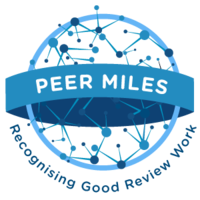About

PeerMiles was a research project that focused on recognising the reviewing records of researchers in a decentralised way. The research involved the investigation of three interrelated factors, namely the peer-reviewing process, reviewers, and decentralisation. The investigation of different aspects of the reviewing process involved examining how a review was perceived by different entities of academia, such as authors, reviewers, and editors. The investigation also looked into how a Program Committee of a research event found and selected reviewers, and how PeerMiles could have improved this sub-process of finding and selecting reviewers. Another aspect involved examining the accumulation of the reviewing contributions of researchers.
Zeeshan Jan who was a PhD Student, conducted this research and investigated the following research questions.
An overview of research questions for the project
What is a review?
- What elements of information should have made up the effort in reviewing?
- What elements of information were missing at the time?
- Were these elements independent of variations in the reviewing process?
What was the quality of a review?
- What elements of information should have made up the quality of a review?
- What criteria should have been followed to measure the quality of a review?
What methods were adopted to record reviewing efforts?
- Who maintained the reviewing records of a researcher(s)?
- How were reviewing efforts accumulated across multiple journals/conferences/workshops?
- How/Where did reviewing efforts get stored?
How did researchers’ reviewing efforts get recognition?
- Did researchers get recognition for their reviewing efforts?
- How would researchers have wanted to get recognised for their reviewing efforts?
What methods were adopted to trust researchers’ reviewing contributions?
- Did PC-Chairs trust the reviewing contributions of researchers?
- Was the trust factor important for the reviewing process?
How did one find a suitable reviewer?
- What tools were available to find reviewers?
- Who should have been a suitable reviewer?
What methods were adopted to verify reviewing records?
- How did the reviewing contributions of reviewers get verified?
- What tools were available to verify reviewers?
- What tools were missing?
How could decentralised technology have helped in addressing the issues?
- What impact could it have had on the reviewing process?
- What impact could it have had on researchers?
- What impact could it have had on journals/conferences/workshops?
History
2018
Deployed the first version of the pilot software that stored and retrieved review information from the blockchain on an internal network.
2019
Developed the second version of the pilot software using:
- Database for local storage: MongoDB
- Blockchain for transactions: Ethereum
- Login for researchers: ORCID
- Login for conferences: Solid
2020
Conducted research studies involving semi-structured interviews.
Proposed Framework
Three components
Frontend
HTML, JavaScript.
Details.
Backend
Node.js, MongoDB, ExpressJS
Details.
Blockchain
Ethereum, Web3.js.
Details.
Possible Research Outcomes
- Perception of different aspects of the peer-reviewing process.
- Elements (factors) that were required to constitute a reviewing contribution.
- Recording and accumulation of reviewing contributions of researchers across multiple research events.
- Recognition of reviewing contributions of researchers in the form of immutable lifelong data.
- A tool that was developed to find and select reviewers for research events.
- A transparent way that was used to incentivise reviewers for their reviewing contributions.
Team
Zeeshan Jan
Prof. John Domingue
Dr. Allan Third
Michelle Bachler